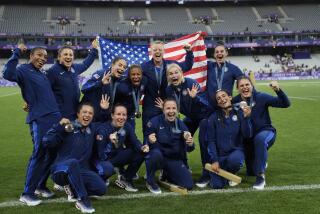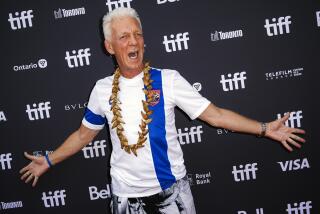New Zealand faces pressure back home
- Share via
LONDON -- It’s a trick to coax American sports fans into any kind of solidarity with New Zealand, especially when polls show that 92% of American sports fans remain unaware of the existence of New Zealand.
Actually, polls don’t really show that, but it’s half-plausible given the American geography ineptitude that worries Miss Teen USA question-writers, and given that Auckland sits so far from Los Angeles (6,508 miles) that flying there makes you literally two days older.
Note: Auckland is a city in New Zealand.
Yet if ever a time surfaced to send a good little wish New Zealand’s way, that time would begin today and straddle the next six weeks. That’s when France, a country of thin people, teems with the hulks of the rugby World Cup, which features 20 nations and draws largely from that vast global pool known as Places the British Empire Once Owned.
Now, the favorite for this Rugby World Cup would be New Zealand’s storied national team, the All Blacks, and although it’s dull to back a favorite, it’s benevolent to back this favorite.
That’s because New Zealand did not win the 2003 World Cup because of a gruesome 22-10 loss to Australia in the semifinals, and New Zealand did not win the 1999 World Cup because of a riveting 43-31 loss to France in the semifinals, and New Zealand did not win the 1995 World Cup because of a clunky 15-12 loss to South Africa in the final at Johannesburg, nor did New Zealand win the 1991 World Cup, what with a disturbing 16-6 loss to Australia in the semifinals.
That’s a lot of not winning World Cups since New Zealand did win the first World Cup in 1987, and for a country of 4 million that generally deems it triple-very important to win World Cups.
Rugby is New Zealand’s national sport, such that in an interview with the Guardian of London, Justin Marshall, a 1987 team member, said, “There will be nowhere to turn if they lose. There are always negatives for New Zealand, because the scrutiny is so intense.”
Now, if you’re an American, and you’ve spent only, say, three days of your life in New Zealand, you might marvel at this idea that New Zealand could summon some sort of vitriol to direct at athletes who do not win. The place seems so lovely, serene, fair-minded.
But if life on Earth has taught us anything, it’s that the human bloodstream abounds with the craven need to summon some sort of vitriol to direct at athletes who do not win. And although the New Zealand media lacks the harrumph reputation of, say, the English media or the Boston media, former player John Drake did sigh relief in the New Zealand Herald, “They’re on the other side of the world, so shouldn’t be bothered by what they might otherwise see in the New Zealand media.”
Whew.
If you’re an American, you might also wonder if the United States has sent a team to France. Yes, and the talent pool includes eight Southern Californians and six members of the Belmont Shore club.
They also enter an event with an unforgiving, two-tiered caste system that has spawned scores such as Australia 142, Namibia 0 (2003); England 111, Uruguay 13 (2003); New Zealand 101, Italy 3 (1999); and England 101, Tonga 10 (1999).
No observer on Earth pictures Yanks gracing the quarterfinals, where eight nations -- New Zealand, Australia, England, France, South Africa, Ireland, Wales and Scotland -- tend to congregate jealously.
So if seeking a place to place well wishes while maybe even learning an iota of rugby, it’s just to spend the next 43 days empathizing with 4 million people on two islands adding up to roughly the size of Colorado.
That’s New Zealand, and not that the expectations have any loft or anything, but the All Blacks have been so accustomed to victory in the last three years that Wynne Gray wrote in the New Zealand Herald: “And, just sometimes, the All Blacks look lost. Throughout the Tri-Nations it was disconcerting to hear they had to be told to alter their plans at halftime, and that sort of indecision does bring a certain tremble.”
Note: The Tri-Nations is an 11-year-old event featuring New Zealand, Australia and South Africa. New Zealand won it for the third straight year and fifth in the last six.
As the World Cup begins today with France vs. Australia, and meanders into three Saturday matches that include England vs. the U.S., it’s certain that the All Blacks will lead the world in pregame ritual -- their traditional haka, a Maori posture dance, knows no peer -- and in yearning by citizens.
After all, Australia just won in 1991 and 1999, South Africa in 1995. And in England, they fret over yet another injury to Jonny Wilkinson, star of 2003, whose sprained ankle joins a four-year hurt list including a broken shoulder, neck surgery, a hematoma in the upper right arm, torn knee ligaments twice, appendicitis, a sportsman’s hernia, an acute injury to a right adductor, a lacerated kidney and a rib injury.
But still, here’s that event with a sentence so achingly rare:
England is the defending champion.
More to Read
Go beyond the scoreboard
Get the latest on L.A.'s teams in the daily Sports Report newsletter.
You may occasionally receive promotional content from the Los Angeles Times.










